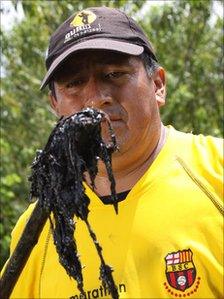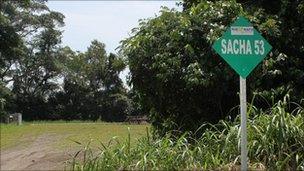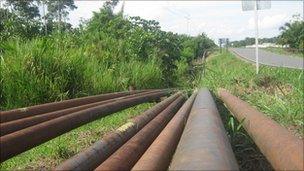Ecuador Amazon oil: Legal battle far from over
- Published

Servio Curipoma is one of thousands of Ecuadoreans who sued for damages
Servio Curipoma moved to Ecuador's Amazon rainforest in 1981, when he was only 10 years old.
His parents, originally from southern Ecuador, decided to move to the Orellana region in the north-east of the country to seek their fortune.
It was the era of Ecuador's oil boom, and US company Texaco was a pioneer in oil extraction in the region.
But things didn't go as planned.
The Curipoma family settled by an oil well that was then being operated by Texaco - something common at the time, as the only existing roads were built by the oil companies to reach their fields.
"We didn't know what consequences it would have on our health," says Mr Curipoma, 40.
Eight years ago, Mr Curipoma discovered that his land actually sat on crude oil when he started building the foundations for a new home. It wasn't a happy discovery.
Mr Curipoma blames Texaco for polluting the whole region. He says contaminated water poisoned his cocoa plants. And he is sure the water caused the cancer that killed both his parents.
Mr Curipoma joined another 30,000 local residents, including five different Amazonian tribes, in a lawsuit against Texaco that was first filed in 1993.
The plaintiffs say that the oil company knowingly dumped 18bn gallons (68bn litres) of toxic waste water and spilled 17 million gallons of crude oil into the rainforest during its operations in north-east Ecuador, from 1964 to 1990.
The plaintiffs say the affected area covers 4,400 sq km (1,700 sq miles) on the border with Colombia. The pollution has led to health problems such as cancer and birth defects, they say.
'Illegitimate ruling'
US oil giant Chevron, which bought Texaco in 2001, denies these allegations.
When on 14 February, a court in Ecuador issued a fine amounting to more than $9bn (£5.5bn) fine, the company said the ruling was "illegitimate and unenforceable," and launched an appeal.

Chevron says millions were spent to clean up the environment
"If there are any environmental damages that currently exist in the region where Texaco used to operate, those problems are entirely the responsibility of the Ecuadorean state and of Petroecuador, the state oil company," said James Craig, Chevron's spokesperson, in an interview in Ecuador's capital, Quito.
Petroecuador, in a consortium with Texaco until the US company left in 1990, took over operations, keeping the same structures and methods of oil extraction.
Chevron says Texaco spent $40m (£24.5m) in clean-up work requested by the Ecuadorean government in the 1990s. They say that once the environmental remediation was completed, officials signed a document releasing Texaco from any further responsibility.
The company also says the high rates of cancer in the region are the result of the lack of water treatment and sanitation systems, and that there is no real science behind the plaintiffs' claims.
A report by a court-appointed expert, which Chevron considers fraudulent, found that cancer rates in the San Carlos village, where Mr Curipoma lives, are 130% higher than in the rest of the country.
Two years ago, Mr Curipoma was re-located by the government a few kilometres down the road, because of the health risks posed by the oil.
But, he says, he is not fighting against Chevron for the money.
"I want people to come here and see the damage," he says. "My parents died in my arms. I have fought together with others so that they don't cause harm to other families, so that other families don't suffer like we have."

Disused oil pipelines are common in the area
However, the plaintiffs are demanding more money, arguing that the 14 February fine is not enough to clean up the affected areas.
Donald Moncayo, a member of the Amazon Defense Coalition, which represents the 30,000 local residents, regularly shows journalists and other visitors around the area.
He says at least 1,000 waste pits were opened up by Texaco around their wells, but since they were not made impermeable, toxic waste gradually seeped into the soil.
Mr Moncayo also argues that the pits have not been cleaned up properly, pointing to one that looks like a pond of black sludge. Walking on it is like trying to walk through quicksand.
Plaintiffs say Petroecuador is currently cleaning one of the pits, at a cost so far of $500,000 (£307,000). Chevron says the figures are much lower.
Petroecuador was asked for its figures but was unable to comment.
"If you add up, you realise that we are not asking for an exaggerated amount," says Mr Moncayo, adding that a court-appointed expert set damages at $27bn (£16.5bn).
The plaintiffs also say that Texaco would regularly dump toxic water (a by-product of oil extraction) into waterways used for drinking, bathing and fishing.
People in the region have stories of their favourite techniques to bathe when the river had black oil floating on top.
Mr Moncayo says he would rub his hands with lots of soap and use the soap to break the oil from the surface to create a small clear space in the water.
It is clear that much damage has been caused in this region, but this ruling is unlikely to bring the case closer to resolution - despite a wait of 17 years.
Chevron spokesman James Craig says the company has no assets in Ecuador and they will not give in to what they think are attempts to extort money from them.
"The plaintiffs have made no secret of their intention to go to places where we do have assets as part as their extortionate scheme to force the company to pay money," he says. "We're going to resist enforcement anywhere in the world, we're going to do anything possible to bring the perpetrators of this fraud to justice."
Regardless of the final outcome, it is a landmark ruling.
It is the largest environmental award in history - far exceeding the initial $5bn award against ExxonMobil for the 1989 Alaska oil spill - and it could well set a precedent. But it might take months, if not years, until the appeal courts revise the case.

20 March: Clarification to make clear the cost of the cleaning the pits is based on plaintiffs figures which Chevron disputes.
- Published15 February 2011
- Published15 February 2011
- Published15 February 2011
- Published1 December 2010